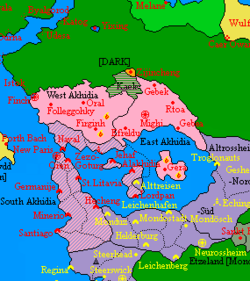User:Mondo/AKH Things
| Kingdom of South Akhidia Suh Akhiďą Físaqła Königreich Sudakhidien | |||
| |||
| Motto: | |||
| Anthem: Ahkiď Įhđiqk | |||

| |||
| Map versions | - | ||
| Capital | New Paris | ||
| Largest city | New Paris | ||
| Official language(s) | Akhidian Cibolan Saxon Tieyan | ||
| Official religion(s) | Nazarene | ||
| Demonym | South Akhidian | ||
| - Adjective | South Akhidian | ||
| Government | Monarchy | ||
| - King | Şahan I | ||
| - Regent | Anastasia | ||
| - Legislature | Ahidar | ||
| Establishment | 1707 AN | ||
| Area | TBA km2 | ||
| Population | 5,769,200 | ||
| Currency | Akhidian Zendert | ||
| Calendar | |||
| Time zone(s) | CMT -11:00 | ||
| Mains electricity | |||
| Driving side | |||
| Track gauge | |||
| National website | |||
| National forum | |||
| National animal | Akhidian Crocodile | ||
| National food | Akhidian Shella | ||
| National drink | Akhidian Paradise Vine | ||
| National tree | Dracaena cinnabari | ||
| Abbreviation | SAK | ||
South Akhidia (Akhidian: Suh Akhiďą; Cibolan Saxon: Sudakhidien), officially the Kingdom of South Akhidia (Akhidian: Suh Akhiďą Físaqła; Cibolan Saxon: Königreich Sudakhidien), is a monarchy in western Cibola. A constituent state of the Akhidian Confederation, its capital and largest city is New Paris.
Etymology
The name Akhidia is commonly believed to derive from the legendary Ark of the Ahit, a mysterious artefact said to bestow fabulous riches upon whomever finds it. An alternative theory holds that the country is named for the mythical Knights of Ahd, a band of courageous warriors who swore an oath to defend the ancestors of the royal House of Zezo. There is little firm historical evidence for either explanation and a definitive answer is unlikely to be found.
History
Government and politics
Officially a semi-constitutional parliamentary monarchy, South Akhidia functions in practice as a military dictatorship. Power is vested in the young king, Şahan I, but exercised on his behalf by a regent, his stepmother Queen Anastasia. The Ahidar, a rump legislature of local representatives elected by adult suffrage, in practice serves only to rubber stamp the regent's decisions, whose authority is underpinned by the Mondoist occupation forces and supported by various local interest groups, most notably the leaders of the Tieyan ethnic group.
Administrative divisions
South Akhidia is organised into twelve provinces, divided between five regions: the Royal Domain, the Duchy of Cezayir, Bretalyon, Tieya and Dunaria. The Royal Domain falls under the direct control of the royal government, while the remaining four enjoy varying degrees of autonomy. Cezayir is the personal dominion of the Queen Mother Anastasia, while the remaining three serve as a self-governing homelands for their titular ethnolinguistic group.
| Flag | Province | Region | Population | Capital |
|---|---|---|---|---|
| North Barbary | Royal Domain | 741,500 | Naval | |
| South Barbary | Royal Domain | 454,000 | Oren | |
| Suro | Royal Domain | 1,167,300 | New Paris | |
| Zezo-Goturg | Cezayir | 185,000 | Zezo-Goturg | |
| Jehaf | Cezayir | 119,200 | Jehaf | |
| File:Alakhidia flag.png | North Ortada | Ceyazir | 162,700 | Alakhidia |
| South Ortada | Ceyazir | 183,400 | Lordpan | |
| East Bretalyon | Bretalyon | 619,500 | St. Litavia | |
| West Bretalyon | Bretalyon | 585,900 | Germanije | |
| East Tieya | Tieya | 586,700 | Hecheng | |
| West Tieya | Tieya | 434,000 | Minerio | |
| Dunaria | Dunaria | 530,000 | Santiago |
Demographics
South Akhidia has a population of 5,769,200.
Ethnic groups
South Akhidia is home to six distinct ethnic groups. The largest community, accounting for around 22% of the population, are the Batii. The Batii are a Matbaic people who originated in eastern Cibola, before migrating westward in the course of the previous two centuries.
The Tieyan people form the second largest group, with some 21% of the population. Descendents of the inhabitants of the epononymous kingdom in the south-west of the continent, the Tieyans are now found throughout the Barbary Peninsula and to the north of the straits.
The third most numerous ethnolinguistic group are the Bretallois, representing just under 19% of the kingdom's inhabitants. The Bretallois speak a Britannic language similar to Steerish and are concentrated primarily in the central portion of the Barbary Peninsula.
The Batavians also have a long history in the region. They account for approximately 10% of the population.
The origin of the Fentoaian people is disputed. According to some traditions, they are descended from Euran refugees who fled to Cibola and were enslaved by the Batii. They also form around 10% of the population.
The Dunarians, who inhabit the south-western coast, speak a proto-Alexandrian dialect. However, recent genetic studies have suggested that they share a common ancestry with the neighbouring Steerish.
Religion
Religious adherence in South Akhdia
The Nazarene faith is by far the most widely practiced religion in South Akhidia, followed by nearly seventy percent of inhabitants. The Matbaic Orthodox Church was traditionally promoted by the ruling Batii elites in Akhidia, but in recent years the Nidarosian Catholic Church has gained in popularity and today, the two sects are roughly equal in numbers of adherents.
Umraists make up five percent of the population, while practioners of traditional Tieyan faiths are estimated to account for a further ten percent, although there is some overlap between this latter group and the Nidarosian Nazarene community.

